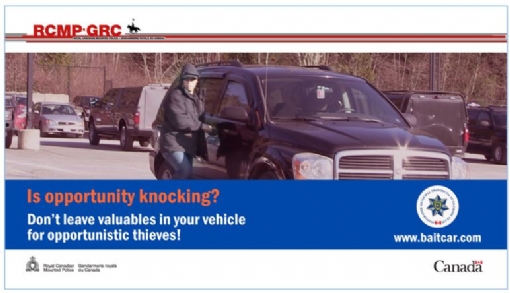Crime Awareness
Crime Prevention Tips
Whether at home, in your car, at work, travelling or walking in your neighbourhood, awareness is the best protection against crime. Criminals often target groups or individuals who appear vulnerable. Here are tips to assist in maintaining you personal safety wherever you are:
- Always know your surroundings
- Be prepared for anything that may put you at risk
- Walk with confidence and purpose
- Keep your head up and observe your surroundings and the people in the area
- Don't appear to be confused or lost
- Plan your route to avoid isolated areas
- Don't overburden yourself with heavy parcels, a bulky purse or briefcase
- Use a moneybelt or pouch to conceal money and important documents
- Don't display cash in public
- Walk near the curb and away from alleys and doorways
- Consider the buddy system
- Don't wear headphones; if you do, remove one of them from your ear so you can hear behind you
- Vary your route - don't be predictable
- Wear reflective clothing if you're out at night
- Always carry personal identification
On Public Transit
- Avoid isolated or poorly lit transit stops
- Sit near the driver or emergency contact panel
- Don't sleep on public transit
- Don't leave your personal belongings on the floor, hold them on your lap
- If you are traveling at night, ask the driver if it is possible to drop you closer to your home than at the bus stop
On Holidays
- Don't put your home address on luggage tags
- Review travel advisories before you depart (www.voyage.gc.ca)
- Use traveller's cheques and carry minimal cash
- Carry money, passports, visas and other important documents in a money belt or money pouch
- Wear minimal jewellery and use the hotel safe
- Use the same crime prevention tips as you would at home
- Let someone at home know your itinerary and how to contact you
Safety & Security in the Car / Property
- Remove valuables (electronics, loose change, golf clubs, fishing rods & supplies,etc.) from your vehicles / boats!!! If you must store valuables, keep them out of sight
- Keep records / photos of serial numbers to valuables in a safe place & or engrave these items
- Keep your vehicle fuelled and maintained
- Park in well lit areas near other vehicles
- Have keys ready before you get to your car
- Check the back seat of your car before entering
- Always lock your vehicle after entering and when leaving it
- Don't put your purse on the passenger seat, keep it on the floor or in the trunk
- Never pick up hitchhikers
- Plan your route and carry a map
- Carry a cellular phone for emergencies
- If you car should break down, turn on hazard lights, remain in your vehicle with the doors locked and wait for assistance. If someone offers to help, don't get out of the car, roll down the window only enough to talk and ask them to call the police
- If you believe you're being followed, drive to the nearest business or police station and blow the horn to attract attention
Identity Theft
Identity theft is serious. It occurs when someone steals your personal information to commit a crime. There are ways to minimize the risk of having your identity stolen.
Signs of ID Theft
- Unknown/unidentified purchases appear on your monthly bills
- Bills arrive for accounts you don't own
- Collection agency calls about unknown debt
- Credit card/bank statements don't arrive
- Your credit report shows mystery debts
What to Do
- Call financial institutions and local police
- Put a fraud alert on your credit report by contacting Equifax at 1-800-465-7166 and TransUnion at 1-877-525-3823.
- To replace your ID cards like health, driver's licence, SIN, call 1-800-0-CANADA
- Contact Canada Post if your mail is missing
- Keep records of steps taken to clear your name and re-establish your credit
- Help stop frauds - contact PhoneBusters at 1-888-495-8501 or phonebusters.com
- Report, Keep up to date & self-educated on the latest fraud trends on the Canadian Anti-Fraud Centre website ( http://www.antifraudcentre-centreantifraude.ca/index-eng.htm )
Guard Your Personal Information
- Never give personal information by phone, internet or mail unless you initiate the contact
- Be careful about sharing personal information and don't give out more than you need to
- Shield your PIN and never lend cards
- Report missing credit and debit cards
- Carry only the ID you need
- Put other ID documents in a safe place (birth certificate, SIN card, Passport)
- Shred document with personal information
- Do not carry your SIN card - it is only for employment and tax reporting
- Ask about the security of your information at work, with businesses and charities
Guard Your Computer and its Information
- Select a complex password of letters, numbers and symbols
- Install firewall, anti-virus, anti-spyware and security software and update these often
- Don't try, don't buy and don't reply to spam or emails that ask for banking information
- For online transactions, look for https://, a closed lock or an unbroken key icon
- When disposing of hard drives, use overwrite software or destroy the drive.

